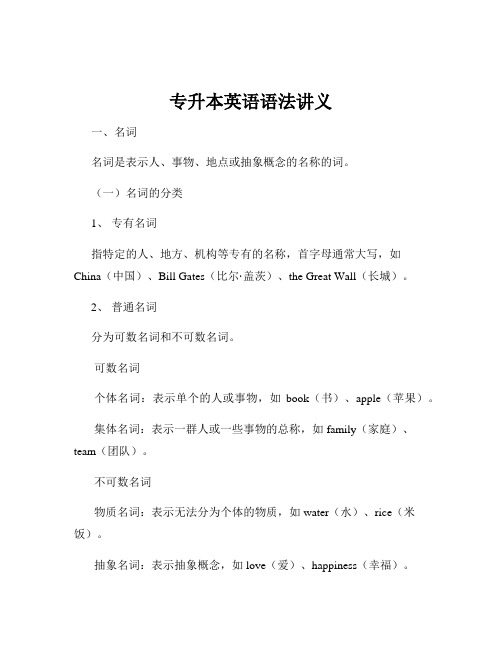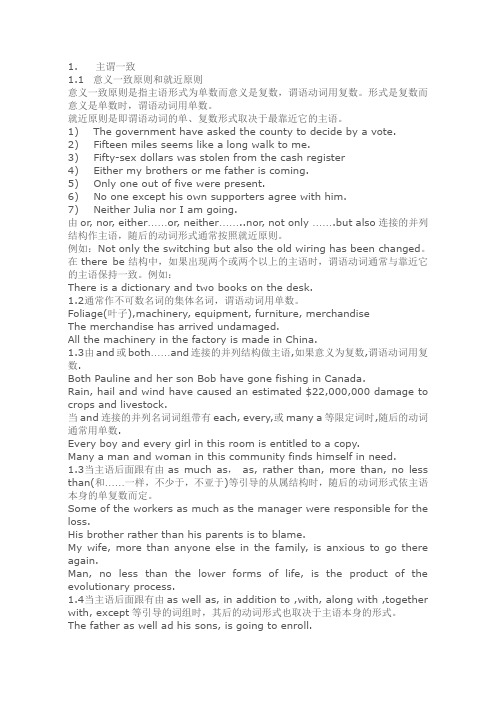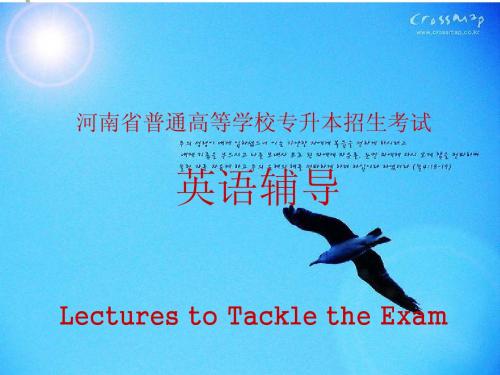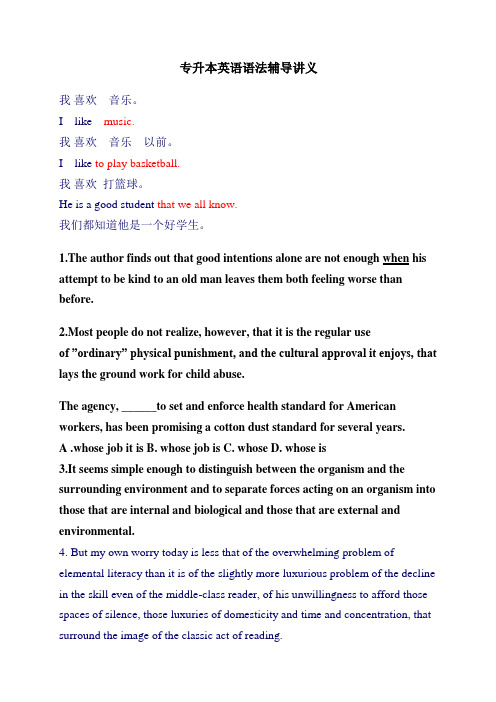专升本英语考试技巧讲座讲义
专升本英语语法讲义

专升本英语语法讲义一、名词名词是表示人、事物、地点或抽象概念的名称的词。
(一)名词的分类1、专有名词指特定的人、地方、机构等专有的名称,首字母通常大写,如China(中国)、Bill Gates(比尔·盖茨)、the Great Wall(长城)。
2、普通名词分为可数名词和不可数名词。
可数名词个体名词:表示单个的人或事物,如book(书)、apple(苹果)。
集体名词:表示一群人或一些事物的总称,如 family(家庭)、team(团队)。
不可数名词物质名词:表示无法分为个体的物质,如 water(水)、rice(米饭)。
抽象名词:表示抽象概念,如 love(爱)、happiness(幸福)。
(二)名词的数1、可数名词的复数形式一般在名词后加 s,如 books,apples。
以 s,x,ch,sh 结尾的名词,加 es,如 buses,boxes,watches,dishes。
以辅音字母+ y 结尾的名词,把 y 变为 i 再加 es,如 city cities,baby babies。
但以元音字母+ y 结尾的名词,直接加 s,如 boy boys,day days。
以 f 或 fe 结尾的名词,把 f 或 fe 变为 v 再加 es,如 knife knives,leaf leaves。
但有些词直接加 s,如 roof roofs,chief chiefs。
不规则变化,如 man men,woman women,child children,foot feet,tooth teeth 等。
2、不可数名词的量化不可数名词要表示数量,需要用量词短语,如 a piece of paper(一张纸),a cup of coffee(一杯咖啡),two bottles of water(两瓶水)。
(三)名词的所有格1、表示有生命的名词的所有格一般在名词后加's,如 Tom's book(汤姆的书)。
专升本英语考试辅导 ppt课件

• This is the best film that I've (ever) seen.
专升本英语考试辅导
• When the police arrived, the thieves had run away.
• 现在完成时的时间状语:for, since, so far, ever, never, just, yet, till/until, up to now, in past years, always等 ,皆不确定的时间状语。
• I saw this film yesterday. (强调看的动作发生过了)
• When I was a child, I often played football in the street.
• Whenever the Browns went during their visit, they were given a warm welcome.
专升本英语考试辅导
• I decided to go to the library as soon as I _______. A) finish what I did B) finished what I did C) would finish what I was doing D) finished what I was doing
• be used to + doing: 对……已感到习惯,或"习惯 于",to是介词,后需加名词或动名词。例如:
•
He is used to a vegetarian diet.
•
专升本英语语法精品讲义ppt课件

9.It was a meeting________importance I did not realize at the time. A.which B.at which C.its D.whose 解析:定语从句修饰meeting,引导词whose在定语从句中
语法专练
1.I have seen the film,________leading actor is my
favourite. A.its B.that C.whose D.which 解析:定语从句修饰film,引导词在定语从句中作 leading actor的定语,表所属关系。 答案:C 2.The girl________everybody had thought could win a gold
的关系,whom作of的宾语。 答案:C
定语从句(二) 1.whom,which在定语从句中可作介词的宾语,这样的介词一
般放在whom,which之前也可放在原来的位置上。that也可作 介词宾语,但介词不能放在that前,只能放在原位置上;含有 介词的固定词组,介词也只能放在原位置上。 This is the nurse to whom Tom spoke just now.=This is the nurse whom Tom spoke to just now. 这就是那个Tom刚才跟她谈话的护士。 The child whom you take care of is ill.你照看的那小孩病了。
码”。后面是倒装句。 答案:C
7.I don’t like the way________he spoke to me. A.what B.by which C.by that D./ 解析:定语从句修饰way,引导词作状语时可用in which/that/不填。 答案:D
福建专升本英语语法讲义

1.主谓一致1.1意义一致原则和就近原则意义一致原则是指主语形式为单数而意义是复数,谓语动词用复数。
形式是复数而意义是单数时,谓语动词用单数。
就近原则是即谓语动词的单、复数形式取决于最靠近它的主语。
1)The government have asked the county to decide by a vote.2)Fifteen miles seems like a long walk to me.3)Fifty-sex dollars was stolen from the cash register4)Either my brothers or me father is coming.5)Only one out of five were present.6)No one except his own supporters agree with him.7)Neither Julia nor I am going.由or, nor, either……or, neither……..nor, not only …….but also连接的并列结构作主语,随后的动词形式通常按照就近原则。
例如:Not only the switching but also the old wiring has been changed。
在there be结构中,如果出现两个或两个以上的主语时,谓语动词通常与靠近它的主语保持一致。
例如:There is a dictionary and two books on the desk.1.2通常作不可数名词的集体名词,谓语动词用单数。
Foliage(叶子),machinery, equipment, furniture, merchandiseThe merchandise has arrived undamaged.All the machinery in the factory is made in China.1.3由and或both……and连接的并列结构做主语,如果意义为复数,谓语动词用复数.Both Pauline and her son Bob have gone fishing in Canada.Rain, hail and wind have caused an estimated $22,000,000 damage to crops and livestock.当and连接的并列名词词组带有each, every,或many a等限定词时,随后的动词通常用单数.Every boy and every girl in this room is entitled to a copy.Many a man and woman in this community finds himself in need.1.3当主语后面跟有由as much as,as, rather than, more than, no less than(和……一样,不少于,不亚于)等引导的从属结构时,随后的动词形式依主语本身的单复数而定。
专升本讲座-第一讲

(E).表示时间的前缀 pre-(在…前面,先于) prewar post-(在…后面) postwar fore-(前,预先)
foretell(预言), forecast(预测), foresee(预见,预知), weather forecast
常见的后缀
1.动词变名词: -ation satisfaction, education, realization -ment development, movement, disappointment
前缀一般只引起意思上的变化而不 造成词类的变化,只有少数能引起 词类的变化。
mis- 错误的 + understand v. 理解 --- misunderstand v. 误解 en + large adj. 大的 --- enlarge v. 扩大
后缀一般只引起词性上的变化而不 造成意思的变化。
60
20 20
60
20 20
60
10 20 10
40
20 20 10
40
20 20 10
40
20 20 10
40
20 20 10
40
20 30
40
20 20
40
20 20 0
10 20 150
10 20 150
词汇语法
词语用法和语法结构部分的目的是测试学生运用词汇、短语 及语法结构的能力。
单项选择题,40题,40分,词汇题约占55%,包括单词辨 析,词组辨析;语法题约占45%,包括主谓一致,各种从句, 强调句,虚拟语气,倒装,时态等。 要求:1、掌握4000左右的基础英语单词和相应的常用词组。 2、掌握英语语法结构的情况和对时态、语态的使用 能力; 3、对非谓语动词以及各类从句的掌握情况; 4、对虚拟语气、强调句、倒装句以及主谓一致的使 用能力。
2024年专升本英语考试辅导课件

2024年专升本英语考试辅导课件一、教学内容本节课将围绕《2024年专升本英语考试辅导教材》第三单元进行,详细内容包括:语法部分(被动语态的运用)、词汇部分(词根词缀的理解与运用)、阅读理解部分(快速阅读与信息提取)、写作部分(议论文写作框架构建)。
二、教学目标1. 掌握被动语态的构成及其在句子中的运用。
2. 学会利用词根词缀扩大词汇量,提高阅读理解能力。
3. 提升阅读速度,掌握快速提取关键信息的方法。
4. 学会构建议论文写作框架,提高写作水平。
三、教学难点与重点教学难点:被动语态的运用、词根词缀的记忆与运用、议论文写作框架构建。
教学重点:被动语态的构成、词汇量的扩大、阅读速度与理解能力的提升、写作技巧的掌握。
四、教具与学具准备1. 教具:多媒体设备、PPT课件、黑板、粉笔。
2. 学具:教材、笔记本、文具。
五、教学过程1. 实践情景引入(5分钟)利用多媒体展示一个实际生活场景,让学生尝试用英语描述场景中的动作,引导学生关注被动语态。
2. 语法讲解与例题分析(15分钟)讲解被动语态的构成,通过例题分析,让学生掌握被动语态在实际语境中的应用。
3. 词汇教学(10分钟)介绍词根词缀,引导学生运用词根词缀记忆词汇,扩大词汇量。
4. 阅读理解训练(15分钟)进行快速阅读训练,教授快速提取关键信息的方法,提高阅读速度与理解能力。
5. 写作教学(10分钟)讲解议论文写作框架,通过示例分析,让学生学会构建写作框架。
6. 随堂练习(10分钟)分发练习题,让学生现场完成,巩固所学知识。
7. 课堂小结(5分钟)六、板书设计1. 语法部分:被动语态的构成及例句。
2. 词汇部分:词根词缀及典型词汇。
3. 阅读部分:快速阅读技巧及关键信息提取方法。
4. 写作部分:议论文写作框架。
七、作业设计1. 作业题目:(1)用被动语态改写下列句子:A. The teacher corrected the students' homework.B. They built this bridge in 1990.(2)阅读短文,回答问题。
专升本英语辅导讲座01

• • • • •
The boy The cute boy The cute boy in blue jeans The cute boy wearing blue jeans The cute boy who is wearing blue jeans
专升本英语辅导讲座
第一讲 名词及名词短语
Introduction
语言的构造级别
1.词 word 词 2.短语 phrase 短语 3.句子 sentence 句子 4.段落 paragraph 段落 5.篇章 discourse 篇章
英语中的短语有很多种类
动词短语 have been doing 介词短语 for you 名词短语 my best friends …… 其中,名词短语最为重要, 其中,名词短语最为重要,是句子中不可 或缺的元素 名词与它的修饰语一起即构成名词短语
is my brother.
修饰名词的定语的语序位置
左二右六规律
限定词+形容词 中心名词 六类后置定语 限定词 形容词+中心名词 形容词 中心名词+六类后置定语
介词短语 分词短语 不定式短语 形容词短语 定语从句 同位语从句
英语句子的五成分
主谓宾定 主谓宾定状补 主谓宾状补——句子成分 主谓宾状补 句子成分 定语——短语成分 定语 短语成分
1.1.2 名词的分类
意义 专有名词 例词 表示特定的人、 表示特定的人、物、 Paris, the United 机构或场所的名词 States, Bill Gates 首字母需大写) (首字母需大写) 个体名词 表示同类的人或物中 student, tree, hospital, house, 的个体 piano 表示若干人或物的总 team, committee, police, group, 称 family 表示物质和材料的总 paper, water, cotton, air 称 表示动作、性质、 表示动作、性质、状 birth, happiness, 态或情感等抽象概念 evolution, technology, 的名称 management, imagination, hope
江西省专升本英语辅导讲义

专升本英语语法辅导讲义我喜欢音乐。
I like music.我喜欢音乐以前。
I like to play basketball.我喜欢打篮球。
He is a good student that we all know.我们都知道他是一个好学生。
1.The author finds out that good intentions alone are not enough when his attempt to be kind to an old man leaves them both feeling worse than before.2.Most people do not realize, however, that it is the regular useof ”ordinary” physical punishment, and the cultural approval it enjoys, that lays the ground work for child abuse.The agency, ______to set and enforce health standard for American workers, has been promising a cotton dust standard for several years.A .whose job it is B. whose job is C. whose D. whose is3.It seems simple enough to distinguish between the organism and the surrounding environment and to separate forces acting on an organism into those that are internal and biological and those that are external and environmental.4. But my own worry today is less that of the overwhelming problem of elemental literacy than it is of the slightly more luxurious problem of the decline in the skill even of the middle-class reader, of his unwillingness to afford those spaces of silence, those luxuries of domesticity and time and concentration, that surround the image of the classic act of reading.第一章、时态和语态<主要是指谓语动词>一.时态⒈现在时(1)一般现在时He likes music.(2)现在进行时He is doing the housework.(3)现在完成时He has finished the work.(4)现在完成进行时He has been studying English for six years.注意:The house has been in bad repair since he lived in it.The house has been in bad repair since he moved out .The house has been in bad repair since he has lived in it.I haven’t eaten snails since I was a student at Indiana University.I haven’t eaten snails since I left Indiana University.I haven’t eaten snails since I have been a student at Indiana.⒉过去时(1)一般过去时He watched TV last night(2)过去进行时He was doing his homework at this time yesterday.(3)过去完成时<过去的过去>He had worked for six years before Marry joined the Army.(4)过去完成进行时He had been working for the factory before Marry joined the Army.⒊将来时(1)一般将来时I will study English next week.I shall study English next week.I am going to study English next week.I am about to study English next week.I am to study English next week.区别:will 和be going to, be about to, be to 的区别如:If the metal is heated, it will expand.I am going to study English next week.I am about to study English next week.I am to study English next week.区别:be going to , be about to ,和be to 的区别如:Look , so many black clouds , it is going to rain.当有预先征兆的时候我们应该用be going to.(2)将来进行时I will be studying English at six o'clock tomorrow.如果是将来的一个具体时间我们可以用将来进行时.(3)过去将来时He said,"I will study English next week."He said that he would study English the next week.(4)将来完成时We will have finished the work by next year.43. By the end of last month, we ______ on this project for more than 6 weeks.(09)A) have worked B) had worked C) are working D) will work68. By the time you get there this afternoon, the film ____.(06\07)A) is to start B) is starting C) will start D) will have started44. We plan to finish the work on the 15th of next month. By then, we ___ for ten weeks.(05)A) are working B) have been worked C) were working D) will have worked60. By the end of this year, it _____ 16 years since the emergence of the World Wide Web as an electronic–publishing vehicle.(05)A) has been B) will have been C) will be D) had been特例:⒈He is always speaking to his mother like this.当表示一种埋怨和责备语气的时候用现在进行代替一般现在时.二.语态主动语态I wrote a letter yesterday.I will write the book.被动语态The letter was written by me yesterday.The book will be written by me.56. The professor was so popular that he _____ with enthusiasm.(07)A) always listened to B) always was listenedC) was always listened D) was always listened to特例:⒈I made him cryHe was made to cry by me.⒉I heard him sing the song yesterday.He was heard to sing the song by me yesterday.第二章、句子结构主谓宾定状补表同位I like music.<主谓宾>I gave you a bike.<双宾>I have a r ed pen.<定语>He studies hard.<程度状语>程度状语He studies english in the afternoon.<时间状语>时间状语He sings in the classroom<地点状语>He is late because he is ill.<原因状语>He goes to school by bus.<方式状语>If you come here he will come too.<条件状语>备注:在时间状语从句和条件状语从句中从句不能用将来时He came here to look after me.<目的状语>He got up so early that he caught the bus.<结果状语>He got up so early that he could catch the bus.<目的状语>He came here with a smile.<伴随状语>The Army walked in the street while people were dancing.<伴随状语> Although he is a little boy, he knows a lot. (让步状语)补语<宾补,主补>I call you Tom .<宾补>I find english easy.<宾补>sb. sb adj.You are called Tom.<主补>I am a student.<表语>I am excited.< 系表结构>同位语<同位主语,同位宾语>You two are foolish.<同位主语>I beat you two.<同位宾语>第三章、主从复合句<必须满足:⒈只有一个句号⒉主句和从句之间必须要有连接词,连接词有两个功能,一是起到连接从句,整体作为整个主句的一个成分,二是连接词本身在从句中单独也做一个成分⒊从句必须用正常语序>主语从句What your name is is not known.<主语从句>That he came here made us happy.<主语从句>宾语从句I do not know what your name is.<宾语从句>I find (that) English is easy.<宾语从句>52. The meeting was put off until next week, which was exactly ______ we wanted.(06)A) it B) which C) that D) what同位主语从句The news that he will come here makes us happy.<同位主语从句>The result whether the team has won the game is not known.<同位主语从句>76. We have to face the fact ____ new computer viruses may appear at any time and it can spread across computers in a very rapid speed.(09)A) that B) it C) which D) what43. All _____ the people want are lasting peace and social progress.(05)A) what B) such C) those D) which50. The United Nations expressed the hope ___ the two sides should soon stop fighting in the area.(05)A) which B) that C) what D) when表语从句Money is what I want.<表语从句>49. What the doctor advises me to do is ____ I must keep talking awell-balanced diet and regular exercises.(09)A) that B) whether C) which D) what名词性从句的特例<whether 和if(是否)的区别>⒈The question is whether the film is worth seeing <在表语从句中只能用whether不用if>⒉The news whether our team has won the watch is unknown.<在同位语从句中只能用whether>⒊Whether we will attend the meeting is unknown.<在主语从句中只能用whether>⒋It is unknown whether <if>we will attend the meeting.<当它转换成形式主语时两者都可以用>⒌It all depends on whether we will support him.<在介词后面只能用whether>⒍He does not know whether to stay or not.<如果是直接接动词不定式只能用whether>⒎He does not know whether (if) he should stay or not.<如果引导的是这种宾语从句两者皆可以用>⒏He did not know whether or not she has been ready.<如果是直接跟or not 只能用whether>⒐I wonder if /whether the news is true.<如果引导的是这种宾语从句两者皆可以用>⒑He was not sure if/whether it is right or wrong.<参见第四种>⒒I do not care if it does not rain.<如果宾语从句是否定句习惯上用if>状语从句If you come here he will come too.<条件状语从句>备注:在时间状语从句和条件状语从句中从句不能用将来时He is late because he is ill.<原因状语从句>He got up so early that he caught the bus.<结果状语从句>He got up so early that he could catch the bus.<目的状语从句>The Army walked in the street while people were dancing.<伴随状语从句>I came here when you went out.<时间状语从句>I will go where our country most needs me.<地点状语从句>I did the thing as you said.<方式状语从句>44. He didn’t realize he had left the files in his customer’s office ______ he went back to the company.(09)A) if B) until C) unless D) since67. He will go abroad to further his study next year _________ he gets a scholarship or enough money. (09)A) if B) so C) till D) although73. ____ she joined the company only a year ago, she’s already been promoted twice.(09)A) Because B) If C) Although D) When42. John frequently attempts to escape being fined whenever he ____ traffic regulations.(08)A) breaks B) is breaking C) will break D) broke72._____we entered the hall, an attendant came up and offered us a list.(08)A) As long as B) As far as C) As well as D) As soon as78._______John is in rather poor health, he can hardly resist catching colds.(08)A) Although B) Since C) After D) opposed51. I ____ my breakfast when the morning post came.(07)A) was having B) had been having C) had D) am having62. ______ we were given the right address, we found her house easily.(06\07)A) Since B) Although C) If D) So54. Most of the graduating students have decided to go ______ they are most needed.(06)A) where B) which C) what D) how补语从句I put the book where it was.<状语从句,也可理解为补语从句>A big room定语从句先行词关系词<包括关系代词,关系副词>关系代词:which that who whose whom as关系副词:where when why限制性定语从句This is the house (which) luxun lived in.=This is the house (that) luxun lived in.=This is the house in which luxun once lived.This is the house where luxun once lived.<瞻前顾后>I saved the boy whose mother is my teacher.He is the man who saved the boy yesterday.He is the boy (whom) the man saved yesterday.I will never forget the day when I joined the Army.=I will never forget the day on which I joined the Army.This is the house where luxun once lived.I do not know the reason why he is late.45. I don’t k now _____ will make the final decision for our summer trip.(09)A) what B) which C) whom D) who52. In his speech he advice to____ was interested in the field of computer science.(09)A).that B).whoever C) whom D) whose79. Each ARS scientist ____ proposal was accepted will receive $80000 for two years of high-priority research.(09)A) who B) whose C) which D) what48. As to the election, please give your vote to ____ you think you can trust.(08)A) who B) whom C) one D) whoeveras⒈He is as(so) great a painter as ever lived.(as…as,so…as)⒉I bought such a watch as is shown on TV.<当such a 修饰先行词时用as>61. We hope that such a book _____ is helpful to our research work is onsale.(05)A) that B) as C) which D) till⒊I bought the same watch as (that)is shown on TV<当the same 修饰先行词时用as>⒋He is a good student, which (as) we all know.< 当在非限制性定语从句中代替前面的一句话时用as或which但一旦提前只能用as>例如:As we all know , he is a good student.非限制性定语从句I will go to Beijing , where there is a meeting.That 不能用于非限制定语从句He is a good student, which (as) we all know只有非限制性定语从句关系代词which\as才可以代替前面一句话59. _____ I explained on the phone, your request will be considered at the next meeting.(09)A) As B) That C) Which D) What61. The mountains also prove to be a tourist attraction as some of the mountains experience alpine (高山的) conditions, _____ leads to ski resorts.(09)A) who B) which C) it D) that69. He was looking forward to the time _______ he would have to attend the interview.(06)A) where B) that C) why D) when定语从句的特例特例:一.如果先行词是all, sth, nothing, anything 等不定代词时或者先行词被only,最高级,序数词所修饰时,只能用that,不能用which例如:He told us all that he knew.He told us sth that he knew.He bought the first watch that was produced by the factory.He bought the most expensive watch that was produced by the factory.二.如果先行词又有人又有物只能用that例如:She spent the whole evening talking about the things and persons that none of us has ever heard of.三.that 在下面情况下做了关系副词例如:I do not like the way that you speak to her.在这里that 可以换成in which 或者不填四、but 在定语从句中的用法(只能用于限制性定语从句,且必须同具有否定意义的主句连用,其先行词可以是人,也可以是物,but在意义上等于“that…not”,“who…not ”,“which…not”)There was not a single student in my class but(who did not) learnt a lot from him.我班上每一个学生都从他那里学到很多东西。
河南专升本最新英语语法课堂讲义

第一讲虚拟语气课堂讲义1.虚拟语气存在于if条件句中和一些固定结构中。
2.虚拟语气总是与动词过去的某种时态形影不离。
一般过去时 did过去完成时 had done had been done过去进行时 was/were doing过去将来时 would/should do过去将来完成时would /should have done过去将来进行时 would/should be doing---- would/should do3. 虚拟语气是通过谓语动词的变化来实现的.If only I had been to Paris last year第一节if条件句中的虚拟语气一、表示对将来过去现在的虚拟If he invites me tomorrow,I will go to his party.(强调行为在将来发生的可能性大---真实条件句)If he invited me tomorrow,I would go to his party(强调行为在将来发生的可能性小----虚拟条件句)虚拟条件句1,表示对将来的虚拟:a. If he invited me tomorrow,I would go to his party.万一b. If he should invite me tomorrow,I would go to his party.万一c. If he were to invite me tomorrow,I would go to his party.Were he to invite me tomorrow,I would go to his party.was 不会出现在虚拟语气的正确选项中(强调行为在将来发生的可能性小)真实:He will probably not invite me tomorrow, so I will not go to his party.小结:was、may不会出现在虚拟语气中。
专升本英语考试试讲PPT

主讲老师:张老师
100+
英语在初高中就是强项 四级已过
基础还有些,目前处于啃老本的状态 70-90+ 试题勉强可以做下去,不敢报四级
英语在中学就渣,继续渣化中 30-60+ 啥是四级
我是谁,我在哪 20+ 英语,没学过
一、(专升本)英语考试题型及分值分布
考试时间:120分钟
题号 一 二 三 四 五 总分
He father bought her a dictionary. 她爸爸给她买了一本词典。
句式5:S(主语)+V(动词)+O(宾语)+C(补语)
We made him our monitor. 我们选他当班长。
记忆单词方法:联想记忆法、语境记忆法、分类归纳记忆法、循环记忆法等
语序与句法结构
He learns English everyday. 他每天学英语。
句法结构Biblioteka 五种基本句型——简单句and/but/or/so——并列句
定语从句
状语从句
复合句
名词性从句
祈使句
感叹句
强调句
特殊句
倒装句
反义疑问句
英语五种基本句型
基本句式一:S V (主+谓) 基本句式二: S V P(主+系+表) 基本句式三: S V O (主+谓+宾) 基本句式四: S V o O (主+谓+间宾+直宾) 基本句式五: S V O C (主+谓+宾+宾补)
句式1:Subject (主语)+Verb (谓语)
The universe remains 宇宙长存。
2024英语专升本讲座ppt全新

Maintain a positive learning attitude, cultivate selfconfidence and perseverance, and persistently prepare for exams.
03
Reasonably arrange daily routines, ensure sufficient sleep and diet, and maintain physical and mental health.
ing
train shorthand and key point summarization skills, learn to filter important information.
Compound dictation
• Exam room practical skills and experience sharing
01
Overview of the English Exam for College Entrance
Examination
Purpose and significance of the exam
02 03
Tip explanation
Provide effective problem-solving techniques for different question types, such as finding topic sentences, locating key information, understanding context, etc.
The proportion of listening, reading, translation, and writing is relatively stable
专升本英语考试辅导 ppt课件

• be used to + doing: 对……已感到习惯,或"习惯 于",to是介词,后需加名词或动名词。例如:
•
He is used to a vegetarian diet.
•
Scarf is used to taking a walk.
专升本英语考试辅导
1)shall/will • Which paragraph shall I read first? • Will you be at home at seven this evening?
• When I was a child, I often played football in the street.
• Whenever the Browns went during their visit, they were given a warm welcome.
专升本英语考试辅导
• I decided to go to the library as soon as I _______. A) finish what I did B) finished what I did C) would finish what I was doing D) finished what I was doing
专升本英语考试辅导
• 4) wish, wonder, think, hope 等用过去 时,作试探性的询问、请求、建议等,而一般过 去时表示的动作或状态都已成为过去,现已不复 存在。
• Mrs. Darby lived in Kentucky for seven years. (含义:达比太太已不再住在肯 塔基州。)
2) be going to +不定式,表示将来。
专转本词汇结构专题讲座

省略If的几种情况
1)当条件状语从句的谓语部分含有had、should、 或were时,就将这样的词had、should、或were 搬到句首把句子写成倒装句而将连词if省略。例如: If you were the manager here, what would you do? Were you the manager here, what would you do? 你若是这里的经理,你会怎么办? If he should act like that again, he would be fired immediately. Should he act like that again, he would be fired immediately. 要是他再那样做,他会被立即 解雇的。
专转本词汇结构专题讲座
语法题难点突破 1---虚拟语气
(强调说话人的主观愿望和假想情况。) 着重复习能引起虚拟语气的某些介词、介词短语 和连词(如lest,in case,otherwise等); 一部分表示建议、主张、命令、紧要等概念的词 语,由于本身隐含说话人的主观愿望,其后的主 语从句、宾语从句。 同位语从句往往采用“(should)+动词原形”; 虚拟倒装句; 在would rather,wish,as if,it‘s time that等句型中使用适当形式表达主观愿望: 混合虚拟句。
另外,下列结构中主语从句的谓语动词也要求用 虚拟语气: It is ordered that …(根据命令、要求……) , It is proposed that …(人们建议……) It is desired that … (最好、需要……) , It is requested that … (人们要求……) It is suggested that … (有人建议……) , It is recommended that …(有人推荐……) It is demanded that …(根据要求……) , It is decided that …(已经决定……) It is arranged that … (已经安排……) 等等。
专升本英语考前阅读辅导PPT课件

上面两个题目中,no.1题方向已经给出;no.2 题问第三段主要内容,即考该段的主题,所以 这个题目的方向为阅读第三段的首末句。
24
当然,有选择地阅读原文,可能会导致对原 文整体理解的欠缺。但是,在考试中,若考生 没 有能力把整篇文章看懂或不能在规定的时间 内做 完题目,也只能退而求其次了。
23
事实上,专转本阅读经常出现一段或两段轮空不考的 情况,尤其是当一篇文章段落比较多的时候更是如此。要 做到有所为有所不为,就要求考生先看题干,对考什么做 到心中有数,然后有效地阅读原文。
1.By“…challenges explanation” (Line 2, para.1) the author means that_____.
35
B.解题技巧:
在做不完整的陈述式题目时候,仍可参考上 面列举的解题步骤。
第一步,阅读题目,找出问题的发问中心。 第二步,带着这些问题来阅读文章。
takes place. D. The name of the bacteria(细菌) in the
cow's stomach. 带着发问中心及选择项目阅读原文。当我们读到
rumen这个词时,可在它下面画一横线,紧接此词 下面一句“first of the four compartments in their stomachs”,正是解释rumen的,可 在它的下面画一虚线并可标出题号和选择项。
28
细读是获取事实和细节不可缺少的方法之 一,它使读者能够接受信息、记忆信息、 分析信息,从而较深入地领会一篇文章。
这类题型主要有三种形式:问句式,不完 整的陈述句和排除法。
专升本英语辅导讲座04(“形容词”相关文档)共16张

He makes far fewer mistakes in spelling than before.
否定意义的词+比较级
表示最高级 nothing, few, never, not
How have you been? It couldn’t be worse.
absolute, alone, dead, empty, equal, eternal, final, horizontal, perfect, primary, pregnant, round, single, square, straight, supreme, unique, unanimous
多音节词,前加more, most 特殊变化
有两种不同形式的特殊的比较 级与最高级的用法
farther, farthest/ further, furthest
四个词都可以指实际距离,further, furthest可用于抽象意义,表示“进
一步的,更多的”与抽象名词连用
older, oldest/ elder, eldest
Tom had a frightened look on his face.
The boy said to his mother in an injured voice that she
should’t have blamed him.
双音节词
以y结尾的词,变y为i,加-er, -est(区分slowly与early)
其它绝大多数双音节词,前加more, most
少数双音节词,以上两种方法皆可
Common, cruel, friendly, funny, handsome, mature, noisy, pleasant, polite, quiet, stupid, tired; hollow, narrow, shallow, clever, tender, feeble, gentle, noble
2021年专升本英语阅读理解复习技巧讲义

阅读理解在浙江省专升本考试中,阅读理解(Reading Comprehension)所占比例最大,总分值60分,占试卷总分五分之二。
这一某些重要测试考生通过阅读获取书面信息能力以及考生对篇章语境中词汇理解和运用能力。
阅读理解分为篇章阅读理解和篇章词汇理解。
篇章阅读理解(一)一、大纲解析篇章阅读理解(Passage Reading) 某些采用多项选取题形式进行考查。
这某些测试分两节:四篇文章和一篇7选5文章。
第一某些为仔细阅读理解,其中每篇长度为300词左右。
每个篇章后有5个问题,共20题。
考生依照对篇章理解,从每题四个选项中选取最佳答案。
篇章阅读材料均选自英文原版材料,涉及报刊、杂志、书籍、学术期刊等。
选材大体特点如下:1、题材广泛,涉及人文科学、社会科学、自然科学等领域,但所涉及背景知识应为学生所理解或已在文章中提供。
2、体裁多样,涉及记叙文、阐明文、议论文等。
3、阅读篇章难度适中,整体难度大体介于浙江省大学英语三级考试与全国英语四级考试之间。
二、做题环节及解题技巧依照专升本考试时间安排,做一篇篇章阅读时间大体需要控制在10到12分钟之内。
要在这个时间内完毕一篇阅读,需要合理安排做题时间和做题环节。
建议做题环节可以分为如下几种阶段:1、审清题目阅读一开始时候,一方面应当读题,可以用一到两分钟时间,理解题干意思,并且可以圈出题目中浮现核心词。
圈出核心词非常重要,这样有助于考生能迅速找到题目所问有关内容,使学生理解文章构造,让她们明白哪些是重点,哪些是次要点。
通过审题,考生可以对题目大体有个理解,这样便能在阅读文章过程中,读到有关内容时提高注意力,能更加着力分析其所含意义,有助于加深印象。
2、阅读文章在阅读文章时候,考生需要以较迅速度从大量材料中捕获有关重要信息,这就便规定考生必要养成良好阅读习惯。
切忌不要逐字逐词阅读,理解每一种单词、词组或句子意思,这样很耗费考试时间,没有效率。
而是应当依照中心词和重点词连贯阅读,把握每段中心句或中心思想,依照题干中标出定位词在文章中定位核心信息,把握文章大意。
- 1、下载文档前请自行甄别文档内容的完整性,平台不提供额外的编辑、内容补充、找答案等附加服务。
- 2、"仅部分预览"的文档,不可在线预览部分如存在完整性等问题,可反馈申请退款(可完整预览的文档不适用该条件!)。
- 3、如文档侵犯您的权益,请联系客服反馈,我们会尽快为您处理(人工客服工作时间:9:00-18:30)。
专升本英语考试技巧讲座大纲:主要有以下几个部分:一、了解考试内容,合理分配时间。
二、了解考试分值,合理预估分数三、了解考试题型,运用考试技巧四、科学记忆单词,提高学习效率五、沉着应对考试,注意相关事项讲座内容:一、了解考试内容,合理分配时间。
1)考试形式和时间分配:成人高考高起点英语考试为闭卷,笔答。
考试时间为120分钟,试卷满分为150分。
考试时注意试题各部分的占分比值,在保证做完所有题的基础上将时间尽可能用在分值较高的部分,争取效率最大化,实在答不上的题也不要放弃,选择题一定要给出选项。
二.了解考试分值,合理预估分数2)考试内容题量及占分比例:说明:1.语音部分大多为常规音标的辨析,极个别情况下会出现特例,所以预估分值考虑最大出错率是1-2题。
2.词汇与语法部分考点内容比较繁杂琐碎,不易系统复习,语法题尽可能都要答对,词汇部分能确定的先做,不能确定的通过各种逻辑分析推断仍不能解决就凭直觉随机选项。
3. 完型填空部分的解题精髓是根据上下文的逻辑关系进行判断,考点一般比词汇与语法部分简单,出错率也应小于这部分。
4. 阅读理解部分是考试占分比例最高的部分,也是得分的重点,所以要在这部分好好下功夫。
理论上说每篇文章应该至少做对三道题,因为文章体裁和难易度的差异会出现简单的篇章全对,难的篇章错的较多的情况。
5. 补全对话部分因为是不要求自己写,只需根据提供的选项作出判断,所以逻辑推理的因素大于文字本身,故应该全对,有些年份的试题会出现超纲或疑难的选项但最多也就一项,不代表普遍现象。
6.最后的写作部分因涉及的因素较多较为复杂,所以预估分值比例低于前面几道大题。
以上预估只是就题论题地说,正常情况下对考试指定教材吃的较透,复习准备也做得较充分的情况下完全可以达到这个预估分值,是一种理想的正态分布。
受考生的个体差异及当年试卷的试题难易度变化分数也会出现较大差异。
三、了解考试题型,运用考试技巧答题技巧总则:先易后难,避轻就重,合理分配时间。
1. 语音答题技巧1.语音1)26个英语字母的读音2)元音字母及元音字母组合的读音3)辅音字母及辅音字母组合的读音4)不符合语音规则的常用词的读音5)单词曲折变化的读音(名词单复数、动词三单、过去式等)2. 语音知识的解题思路1)解题步骤:(1) 放松心情,依次默读每组所给的四个单词。
(2) 仔细辨别每个单词划线部分的发音。
(3) 找出划线部分发音不同的单词(4) 默读每组的四个单词,核实自己的判断。
(此步骤也可不做)2)注意事项:(1) 划线部分考核的不仅有元音及其字母组合的发音规律,也会有辅音的发音。
复习时不能只偏重元音而忽略辅音。
(2) 一些音素在发音过程中受左右相邻的字母发音的影响会产生音变,使得单词的实际读音和音标标出的有出入,通过对照音标和单词拼写大声朗读,对这部分单词加深印象。
(3) 做语音题时不必关注选项的汉语意思。
3. 语音专项练习2. 词汇与语法答题技巧1)大致浏览所给四个选项和句子,迅速判断该题是语法题还是词汇题。
如果是语法题要通过一些标志词来判断该题涉及哪些语法内容。
再进一步回想该语法内容的要点。
如果是词汇题就要先看一下所给四个选项的词是否都认识。
2)在第一遍的大致浏览过程中有些题很容易就可以选出肯定的答案,情况会因人而异,有的人会做的题多有的人会做的题少。
然后再从头开始仔细看没有选出答案的题。
遵循先语法后语义的原则解题。
3)运用排除法:可采取语言排除、逻辑排除、语法排除或选择排除等方法。
先排除掉较容易、较明显的错误选项,缩小范围,而后对剩余的选项进行比较分析,最后确定答案。
4)对于进过分析判断得出的答案不要反复进行检查。
要相信自己的直觉和判断,即使有机会也不要和别人核对答案。
2.考试题型专讲专练二:词汇与语法1)题型特点这部分试题共有十五道小题,每题一分。
分为词汇和语法两部分,词汇主要考察名词同义词、近义词之间的辨析;动词短语之间的辨析;各种代词的用法辨析;介词的固定搭配等,语法主要考察动词时态、语态、非谓语形式的辨析、形容词比较级和最高级的用法、反义疑问句的搭配、虚拟语气、各种从句关联词的用法等,根据最近年份的真题试题分析,词汇题和语法题的比例大概各占一半。
2)解题步骤和技巧:(1) 大致浏览所给四个选项和句子,迅速判断该题是语法题还是词汇题。
如果是语法题要通过一些标志词来判断该题涉及哪些语法内容。
再进一步回想该语法内容的要点。
如果是词汇题就要先看一下所给四个选项的词是否都认识。
(2) 在第一遍的大致浏览过程中有些题很容易就可以选出肯定的答案,情况会因人而异,有的人会做的题多有的人会做的题少。
然后再从头开始仔细看没有选出答案的题。
遵循先语法后语义的原则解题。
(3) 运用排除法:可采取语言排除、逻辑排除、语法排除或选择排除等方法。
先排除掉较容易、较明显的错误选项,缩小范围,而后对剩余的选项进行比较分析,最后确定答案。
(4) 在选定答案时要根据每题的实际情况进行综合的分析判断,采用一种或多种逻辑推理方式解题。
3)词汇与语法专项练习:(1) This lesson is _______ than the last one.A. more easierB. more easyC. very easierD. much easier答案:D解析:形容词比较级的用法。
(2) The football match was ______ because of heavy rain.A. playedB. heldC. cancelledD. continued答案:C解析:词汇辨析,根据语意。
(3) The stone was so heavy that it was difficult for the old man to ____ it.B. reachC. riseD. touch答案:A解析:同义词辨析,根据语意。
(4) When we saw his face,we knew _______ was bad.A. the newsB. some newsC. a newsD. news答案:A解析:冠词的用法。
(5) At the peak of his ____,he was appointed chairman of the board of the big company.A. workB. jobC. taskD. career答案:D解析:同义词辨析。
(6) What would you ________ to eat tonight?A. likeB. wishC. wantD. hope答案:A解析:固定搭配。
(7) Most students didn't ____ what he had said in class.A. answerC. listenD. catch答案:D解析:同义词辨析,根据语意。
(8) Drunken driving is the main ____ of traffic accidents.A. reasonB. causeC. excuseD. result答案:B解析:同义词辨析。
3.考试题型专讲专练三:完形填空1)题型特点专升本的完形填空共有15道小题,每小题2分,共三十分。
完形填空是单句选择填空和篇章阅读的结合体,因此在解题时要既考虑单个的选项又要考虑整体篇章的意义。
因为多了上下文的信息所以完型填空的难度应小于第二部分的题型词汇与语法的选择填空。
完形填空题的考察重点和第二部分单选题大同小异,所不同的是增加了整篇阅读的综合分析和判断,完形填空题的选择项可能是名词,动词,形容词,介词,副词或连词等词汇题,也可能是动词非谓语的变化或动词的时态语态等语法题。
除了扎实的语法基础和词汇基础外,还要求考生有良好的语感以及对各选项的综合分析判断能力2)解题步骤:(1)通读全篇了解篇章结构和大意用1至2分钟的时间快读全文,快读全文是为了把握文章的大意和中心,把握文章发展的基本线索。
快读中,可以不管空格,对要填的内容做一大概的猜测即可。
(2)详读全篇,根据各种综合信息预测填空的单词在掌握文章大意的基础上根据上下文提供的搭配,结构,语意等线索来预测答案,要着眼空格所在的完整句子,瞻前顾后.必要时用铅笔先在卷上做上标记,比如此空可能是某个词性或词义乃至可能是某个词。
重点解决与结构搭配有关的问题。
如果有些填空一时难以作出判断,不要恋战而是继续往下进行,往往进行到下文,前面的填空的信息就会出现或者有了一些有用的线索。
做题时,文章首句和尾句要特别注意,前者往往是文章全貌的窗口,后者往往是起画龙点睛作用和总结性句子。
有些固定搭配的空缺或是上下文有明显提示的空缺在没有看到所给的四个选项之前就可以锁定,这样再看所给选项选择时既很有把握也能节省一部分时间。
(3)将预测答案和所给的四个选项进行比对,找出重叠率最高的选项(4)核对全文,核对的意义不是第二次重做,而是要检查前后是否贯通,内容是否含糊矛盾,再从语法角度仔细检查,以便弥补疏漏。
(5)对于个别难度较大的选项,这种选项往往是同义词语,不容易辨别出它们之间的细微差别,则要凭自己的第一感觉,这和胡猜是两码事,这里是用语感在做选择。
3)解题技巧:做完形填空时在遵循以上几个步骤的同时还要注意解题思路和技巧(1)搭配判断法根据对以往考试的分析,搭配形题目在完形填空中占的比例最重,搭配型问题主要测试常见搭配熟练程度,比如说哪些词要搭配不定式、动名词或某种从句,那些词必须与某个介词搭配,我们在复习时要特别注意短语动词和介词的搭配。
(2)结构判断法结构型问题主要包括句型、句式连接词的选择等,解题时要运用句法知识,把握关键词,从而做出迅速正确的判断,完形空中有很多是利用语法的正确性与逻辑的排斥性之间的矛盾来设计的,因此考生应结合上下文的合理性,及意义关系的逻辑性,选择最佳答案,完形填空中常考的逻辑关系主要有:A.转折,让步 B.因果关系 C.表示递进,补充关系 D.表示对比比较关系。
(3)词义判断法词汇型问题也是完型填空的一个考点,主要测试考生在段落语篇中把握语义连贯性的能力,提供选择的词可能是近义词,形近词,也可能是随意拼凑的四个选项,遇到这类题,既要联系上下文又要有扎实的词汇基础有时还必须根据自己的文化背景知识做出判断。
4)注意事项(1)切勿拿题就做,不看全文。
(2)注意通篇文章的关联度,切勿把每个填空割裂开来做。
(3)切勿把时间和精力消耗在翻译文章上,遇到不认识的词和不明白的句子除非是影响到填空选项的选择,否则可以放在一边。
5)完形填空专项练习:A.What do we mean 1 a perfect English pronunciation? In one sense thereare as many different kinds of English as there are speakers of it. 2 two speakers speak in exactly the same way. We can always hear differences 3 them, and the pronunciation of English varies a great deal in different geographical 4 . How do we decide what sort of English to use 5 a model? This is not a question that can be 6 in the same way for all foreign learners of English. When you live in a part of the world like India or West Africa, 7 there is a long 8 of speaking English 9 general communication purposes, you should 10 to acquire a good varietyof the pronunciation of this area. It would be a fashion in these circumstancesto use as a model BBC English or 11 of the sort. 12 the other hand, ifyou live in a country 13 there is no traditional use of English, you must take as your model some fore of native English pronunciation. It does not 14 very much which form you choose. The most 15 way is to take as your modelthe sort of English you can hear most often.4.阅读理解总解题技巧这部分是整个考试占分比例最高的部分,占总成绩的40%,所以是复习的重点。
